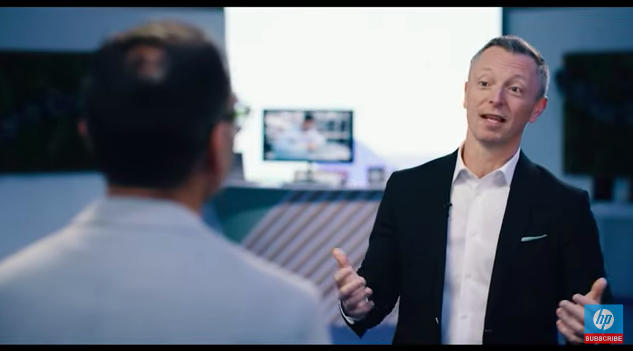Hear from three managing directors about the sustainable business practices moving their regions closer to HP’s goals on climate action, human rights, and digital equity.
By Sunshine Flint — January 11, 2022
After a year marked by the pandemic and unprecedented ecological disasters in Europe, the EU formally adopted the legal framework to reach climate neutrality by 2050. We invited three HP managing directors in the region to a roundtable focused on the company’s sustainability goals for 2030. Bernhard Fauser (Central Europe), Helena Herrero (Southern Europe), and Dave Prezzano (Northwest Europe) reflect on what’s been achieved and the challenges that lie ahead on the company’s sustainability fronts: climate action, human rights, and digital equity.
Who or what has shaped your approach to sustainability?
Helena Herrero: Our planet is sending warnings that either we change the way we consume and act or there’s no turning back. We are experiencing heat waves, droughts, wildfires, floods, and storms that are more frequent and devastating. Everyone — citizens, businesses, and governments — must change their consumption, production, and distribution patterns. Either we all commit, or we can’t save the planet.
Bernard Fauser: I am impressed by the European Union’s ambitious target to reduce carbon gas emissions by 55% from 1990 levels by 2030. Closer to home, my two teenaged children frequently hold me to account on personal sustainability decisions.
Dave Prezzano: My family and I are very active in outdoor pursuits, and we see how important it is to preserve natural landscapes against the effects of climate change. We all need to protect biodiversity and understand that reversing climate change will be a collective effort.
Do you have a personal connection to HP’s Sustainable Impact goals?
BF: With an upsurge of extreme weather, HP’s climate action goals resonate with me. Parts of Germany recently saw one month’s rain in just three days, and as a skier, seeing the glacial retreat in the Alps makes climate change all too real. We can all do more to advance our carbon neutrality progress — making the right real estate, car fleet, or product decisions — while making meaningful investments in our communities and building a deep bench of diverse leaders.
DP: I see myself as the Chief Sustainability Officer of my home. I’m ambitious in limiting my own carbon footprint, and I’m proud to work for a company that has set comprehensive climate action goals. I’m also motivated to encourage more young women to study STEM (my daughter is a chemical engineering student at university), and I believe we need to see greater tangible change in industries to attract and retain young talent and provide them with equal opportunities and equal pay. Locally, we’ve partnered with the Tech Talent Charter to drive equality in the UK tech sector, but we’ve got more work to do.
HH: For me, bridging the digital divide and addressing diversity, equity, and inclusion are essential. I am personally committed to achieving equality in the company and in promoting an interest in science, innovation, and technology among girls. Among my activities, I am on the board of trustees with Junior Achievement Spain, which helps young people with skills for the future.
In 2021, Europe saw record floods, wildfires, and extreme weather. How do you approach climate action in your regions, and what programs are you implementing?
BF: Turbulent weather in Europe is an alarm bell that we can’t ignore. For businesses, assistance is a short-term response, but long-term change recognizes the requirements of customers, investors, and the climate. In Thurnau, Germany, we developed a pilot to renew ink cartridges. By giving cartridges a second life, we go beyond recycling. It’s another step toward reducing our manufacturing footprint, and can potentially be exported globally.
DP: In October 2020, HP Netherlands began a pilot of an electric vehicle fleet, and that was extended to Belgium in early 2021. EVs can play a meaningful role in reducing our environmental footprint, and most of the team members choose them. Other Northwest Europe initiatives include customer Green Boxes with seeds, stickers, and information about our carbon-neutral Managed Print Services. MPS, with its Sustainable Impact Reporting and Analytics [SIRA] tool, helps customers be more sustainable. In the United Kingdom and Ireland, we organized virtual events where employees step away from their screens to pick up litter in our communities. This simple act helped us all feel engaged and connected.
Reforestation and tree planting are a focus of global HP efforts. What is HP doing on this front in your region?
HH: Spain is in the top five countries for forest coverage in Europe and is deeply at risk. We’re working to prevent fires and deforestation, and raise awareness with the public, our partners, and other stakeholders. We have joined Asociación Áreas Verdes’s “Recover Your Forest” program, which aligns closely with the HP Forest Positive initiative. By reforesting an area in Castilla y León with 2,000 native trees, we’re making a small step toward an important goal.
“Turbulent weather in Europe is an alarm bell that we can’t ignore. For businesses, assistance is a short-term response, but long-term change recognizes the requirements of customers, investors, and the climate.”
— Bernhard Fauser, general manager & managing director, HP Inc.
DP: Tree planting is an essential, effective way to reduce the impact of carbon emissions and restore natural ecosystems. The United Kingdom has only 13% tree cover, one of the lowest in Europe, which averages 37%. Locally, we have held tree planting initiatives across the United Kingdom and Ireland, planting 27,100 trees over the last few years, helping local communities while supporting our global Forest Positive commitments. Through the Arbor Day Foundation and Trees of the Land we are continuing our momentum and are set to plant more trees this winter.
BF: In Germany, we planted a “partner forest” with the Plant-My-Tree organization and learned that planting mixed species, not monocultures, reduces disease and pests. We’re also rolling out a carbon- neutral managed print services (MPS) program.
What are the areas where you have encountered the greatest challenges when it comes to sustainability?
BF: Looking at digital equity, we still see a pronounced divide in Europe. For example, ITU [International Telecommunication Union] data shows that 36% of the Central and Eastern European population is still not connected to 4G, versus 19% in Western Europe. We are investing in digital education and skills through HP Foundation’s HP LIFE program, and we’ve enrolled over 66,000 students in Romania, with partnerships starting in Hungary, Bulgaria, and beyond.
HH: To help solve the digital divide, we recognized the need to give educators and students different tools. In Spain, teachers have been able to develop online teaching skills through the free and open-access HP Online Teaching Assistant, which reached over 132,000 teachers in its first 200 days. On gender diversity, there’s still work to be done, but we’ve made progress in Southern Europe: HP Iberia’s Management Committee is 46% female.
DP: The cost of going green is something that customers and companies need to shoulder, although I believe the benefits clearly outweigh the costs. We also need to examine our value chain for opportunities to reduce carbon emissions — sustainable by design, R&D, and end-of-life product strategy.
HP’s sustainability report puts a strong emphasis on stakeholder engagement. Why is HP Amplify Impact important to HP’s sustainability goals?
DP: When engaging with partners, we found that sustainable solutions were often a key part of their strategy, as their customers demand them. Over 80% of our UK and Ireland partners have signed a pledge with HP that taps into HP’s knowledge, training, and resources to assess and improve their sustainability performance while optimizing sustainability driven sales. This enables us to develop joint priorities through the HP Amplify Impact program and educate them on the sustainability areas they consider the most pressing. As of last summer, around 90% of Danish and Swedish partners had also signed the pledge.
HH: Customers are increasingly demanding that suppliers commit to a low-carbon economy with actions to tackle global warming and the environment. For HP and our channel partners, it’s essential we connect with this new consumer profile. Along with pioneering initiatives, transparency with national and international organizations is critical for progress.
BF: The response to HP Amplify Impact in Central Europe has been really positive. On the program’s Catalyst track for those with sustainability plans already in place, close to 100 partners in Germany have pledged to improve sustainability performance. We’re now rolling it out in the rest of Central Europe.
SOURCE HP


